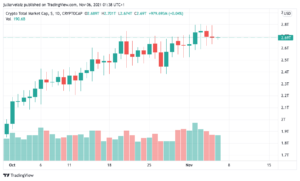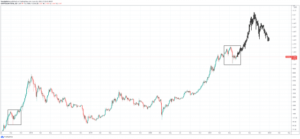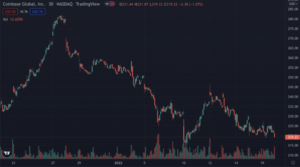It has been argued that Russia may avoid Western sanctions for invading Ukraine by using cryptocurrencies.
However, is it viable?
The small scale of the cryptocurrency market restricts Russia’s capacity to use cryptocurrencies to bypass international sanctions, according to credit rating agency Moody’s.
Analysts predict that sanctions will prompt the Russian Federation to create alternatives to the U.S.-led financial system.
People stand with placards at a demonstration held in central London on February 24 to protest against Russia's invasion of Ukraine. (Photo by JUSTIN TALLIS/AFP via Getty Images)
Taking Refuge In Cryptocurrencies
During Russia’s invasion on Ukraine, the imposition of sanctions, and the accompanying financial market upheaval, the role of cryptocurrencies like bitcoin has been a major topic of discussion.
“Given the small scale and low liquidity of the ruble-to-cryptocurrency market, we assess that, for the time being, crypto assets are unlikely to provide a viable and efficient way for individuals to avoid sanctions,” Moody’s stated.
The sanctions have precipitated a catastrophic devaluation of the Russian ruble. During the first several days of the invasion, the ruble lost about half of its value, rising from 84 rubles to 154 rubles per dollar by March 7.
The bond credit rating division at Moody’s underlines the recent growth in the volume of small transactions conducted by Russians.
When Anonymity Can’t Solve A Problem
According to the agency’s researchers, despite their anonymity, crypto assets are not very useful for dodging monetary penalties.
Fear of hyperinflation first prompted Russians to invest in cryptocurrencies, but their investments have since remained stagnant.
Crypto total market cap at $1.63 trillion on the weekend chart | Source: TradingView.com
Despite initial optimism, Russian oligarchs appear to have largely refrained from trading in bitcoin and other cryptocurrencies since the implementation of sanctions, indicating either that they have decided to wait until the sanctions do the most damage or that they view the cryptocurrency industry with heightened suspicion.
Sanctions enforcement requires the capacity to monitor transactions, generally via the financial system. Iran and North Korea have circumvented sanctions via cryptocurrencies, which operate outside of the financial system.
The head of fraud investigations at Coinfirm, a blockchain risk management platform, told Al Jazeera that cryptocurrencies can be used to escape sanctions and conceal wealth.
Suggested Reading | Nvidia Fined $5.5 Million For Covering Up How Crypto Miners Boosted Its Profits
Moving Large Sums Of Money Is Not Easy
However, other crypto specialists assert that Russia’s situation is unique due to the severity of the economic impact and the country’s limited use of digital currencies.
“Moving significant sums of crypto and converting it to useful currency is quite difficult,” Ari Redbord of TRM labs, a blockchain intelligence company, told Al Jazeera.
“Russia cannot utilize cryptocurrency to replace the hundreds of billions of money that may be restricted or frozen,” he said.
While illicit activities of bad personalities that occur off centralized crypto exchanges or on unregulated digital asset platforms could remain undetected and unreported to authorities, Moody’s stated that such activities are not large enough to allow sanctioned countries such as Russia to circumvent the restrictions.

The Russians are welcome in Dubai. (Image credit: Jumeirah)
Suggested Reading | Crypto Boom In The Gulf: Dubai, Abu Dhabi Fast Becoming Hotbed Of Digital Currency
Welcome To The UAE!
Meanwhile, Dubai has become a shelter for wealthy Russians fleeing the sanctions imposed by the west in response to the conflict in Ukraine.
According to a source, wealthy Russians’ property purchases in Dubai increased by 67 percent in the first three months this year.
The United Arab Emirates has not enforced any kind of sanctions against Russia or criticized its invasion of Ukraine.
Due to its crypto-friendly laws, the Gulf nation has become a hub for the industry, making it a popular location for crypto investors.
Featured image DataDriveInvestor, chart from TradingView.com
- "
- 420
- 67
- 7
- 84
- About
- abu dhabi
- According
- activities
- agency
- alternatives
- Anonymity
- asset
- Assets
- become
- becoming
- being
- billions
- Bitcoin
- blockchain
- bond
- boom
- Boosted
- Capacity
- centralized
- company
- conflict
- could
- countries
- create
- credit
- crypto
- Crypto Exchanges
- cryptocurrencies
- cryptocurrency
- cryptocurrency market
- currencies
- Currency
- Despite
- difficult
- digital
- Digital Asset
- digital currencies
- Dollar
- Economic
- Economic Impact
- efficient
- emirates
- Exchanges
- FAST
- financial
- Financial Market
- First
- fraud
- generally
- Growth
- head
- How
- HTTPS
- Hundreds
- hyperinflation
- illicit
- image
- Impact
- implementation
- increased
- industry
- Intelligence
- International
- Investments
- Investors
- Iran
- IT
- korea
- Labs
- large
- Laws
- Limited
- Liquidity
- location
- London
- major
- Making
- management
- March
- Market
- Market Cap
- million
- Miners
- Monetary
- money
- Monitor
- months
- most
- moving
- North
- North Korea
- Other
- percent
- platform
- Platforms
- Popular
- predict
- property
- protest
- provide
- purchases
- rating
- Reading
- remained
- researchers
- response
- restrictions
- Risk
- risk management
- Russia
- Said
- Sanctions
- Scale
- Shelter
- significant
- small
- SOLVE
- stated
- system
- time
- Trading
- Transactions
- Ukraine
- unique
- United
- United Arab Emirates
- use
- utilize
- value
- View
- volume
- wait
- Wealth
- weekend
- welcome
- West
- year












